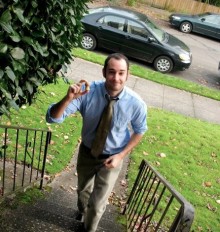Generally, it’s never a good idea to frustrate your readers. Though you may be fleetingly proud of yourself for eliciting an emotional response, nothing good can come of it. First, there’s the crushing sense of failed responsibility to your reader, who gave up a not insignificant chunk of her life to read your writing, and who next time will opt instead to spend that time hunting neighborhood pets, or getting liquored up and driving through golf courses, or watching reruns of Scrubs. Secondly (and more importantly), there’s the hate mail you’ll be forced to ignore.
To avoid these consequences, I’ll give an example of the most frustrating story I ever overheard, followed by some advice on how to achieve the right kind of ambiguity.
I’m riding the bus to work one morning, and I overhear this guy telling another passenger a story. He’s gesturing wildly, his voice alternating between a haggard shout and a hushed whisper, and he keeps referring to the guy next to him, a bearded, cavern-eyed redhead, as his “renowned companion.”
The story is about how they met three days ago on the other side of the country, and how they came to end up here on this bus. It’s a funny story, he keeps saying, but by the tone of his voice it doesn’t seem like he believes that.
Three days ago, this guy is driving his truck away. Away from what? He asks rhetorically. Away from his job, his wife, his lousy bills. Away from everything. It starts to rain, and as the guy flips his wipers on, he sees a hitchhiker on the side of the road. He picks the hitchhiker up, because who would want to be in that rain? He points to his “renowned companion,” who is staring straight ahead, eyes fixed on nothing, and says, soaked like a dog in the deep end.
As they drive through the rain, the guy tells the hitchhiker about his great escape. Sometimes you just have to move. Momentum, you know? The hitchhiker doesn’t have much to say, but the guy can tell he understands. In fact, the guy feels this strong vibe with the hitchhiker, a feeling like he knows him from somewhere.
The guy asks, “Have we met?” The hitchhiker just smiles. Right here, in the bus, the hitchhiker smiles again.
“Of course,” the guy on the bus says, “I didn’t know who he was at that time. I hadn’t figured it out yet.”
He goes on: “I start to get tired from all driving, so I ask my companion if he wouldn’t mind taking over the wheel while I grab a snooze. We switch places and I’m out, dead asleep, just like that. I have a dream where I’m underwater and everything smells like smoke. The deeper I dive the stronger the smell becomes. I wake up and guess what? The hood is on fire.”
The woman to whom I thought the guy was telling the story shakes her head and says, “I can’t do it tonight.” She’s on the phone. I realize that I have no idea who this guy is talking to. Everybody and nobody, I guess.
“I jump out and start running,” the guy continues. “I get maybe five feet away from the car when boom, it explodes. I’m thinking, oh crap, the hitchhiker! But my renowned companion isn’t in the truck. He isn’t anywhere. Vanished. That’s when I feel something small and weighty in my pocket. It’s a smooth little stone, and it has an address written on it in black marker.”
In the bus, the guy pulls out the stone and holds it up. Next to him, the redhead companion grins, and a little whimper of a laugh ekes out.
“I start walking,” the guy goes on. “It turns out that the address on the stone is a little house, just up the street. When I get there and the house comes into view, I am smacked, just blasted with this sense of recognition. I know this house. And then it all comes to me. How I know the house. Who my renowned companion is.”
A dull ding overhead. A sign lights up at the front of the bus and the driver announces the next stop.
“This is us!” the storyteller yells, whacking his renowned companion on the knee. The two stand up together, gathering their bags in a hurry. The bus reels over to the side of the road and the two guys tumble out onto the sidewalk. As the bus pulls away, I watch them look around in every direction, confused, unsure about which way to head next.
I’m five minutes early for work that day, so I stop and grab a coffee and a croissant.
And that was the most frustrating story I ever overheard.
To state the obvious, the reason this story is so frustrating is that it arouses certain questions—who put that rock in his pocket? How does he know the old house? Who is his renowned companion, and why the hell is he always grinning?—that are never answered. Of course, the storyteller hopped off the bus before he could answer these questions, but too many writers (myself included, so many times) hop off the bus before they answer their own questions.
For a fiction writer, ambiguity is a lot like a microwave: if you use it right, it makes life so much easier; if you misuse it, however, your house, or story, can be reduced to a pile of ashes. Moral ambiguity, which relates to whether a certain character’s thoughts or actions are morally sound or flawed, invites the reader to interpret the meaning of the story for herself. This is a good thing. Plot-based ambiguity, or uncertainty as it pertains to the events of a story, is fine as long as you clear up that ambiguity by the end. If not, then you’ve got an unsolved mystery, an episode of Scooby Doo without the obligatory unmasking of Old Man Futterman. And really, who wants to watch that?
In other words, don’t answer any question for your reader that you don’t have to. However, if you have posed questions in your story that require answers, then respect your reader enough to supply those answers. If you don’t, you better hope your mailing address isn’t included in the publication.


